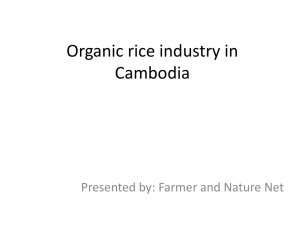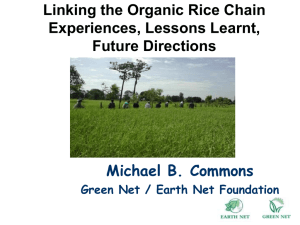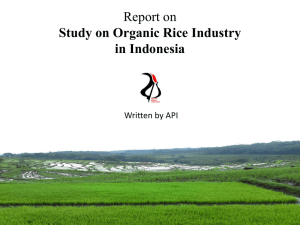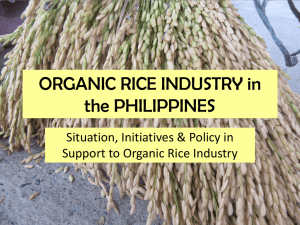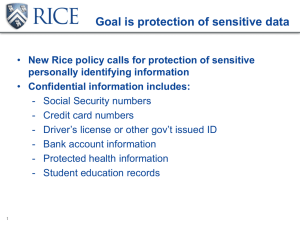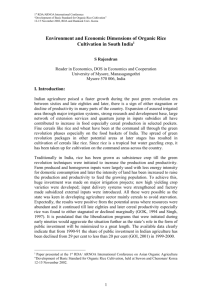Organic Rice Industry in Nepal - Asian Farmers Association for
advertisement
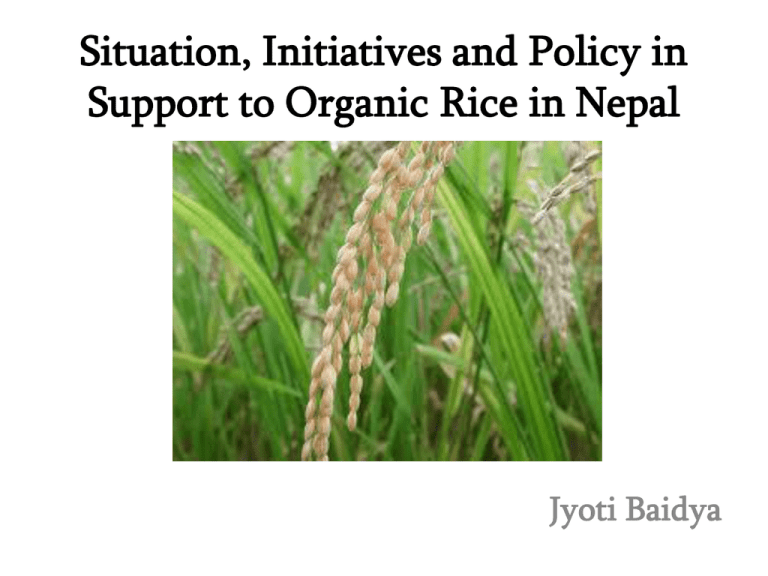
Situation, Initiatives and Policy in Support to Organic Rice in Nepal Jyoti Baidya General Situation of Organic Rice • Nepalese agriculture is central to national economy • Rice , Nepal's Major agriculture product • The rice cultivation in Nepal started about 1,300 years ago in Jumla, valley - well known local variety JUMLEE MARSI. • Traditional rice i.e. organic, covers about 26% area of Nepal's hills and mountain territory. • Growing realisation on the importance of organic farming • Land as the primary factor of production, its ownership by the producer is key to enhance the agriculture production and productivity. The Organic Rice Industry • Rice as as prime crop of Nepal • Covers 1.56 million ha with productivity of 3.06 ton/ha and total production of more than 50,00,000 tons annually - contributing 20% of the agricultural GDP to the country. • Limited organic rice production practice in the Terai. • In hills and mountain-traditional rice production practice. • SRI- 1000 hectares, 1247 farmers in organic farming. • Production in about 46% of the agricultural area as well as employs 65.6% of the country’s population. • Agriculture sector contributes 34 % of Gross Domestic Product (GDP) • Rice accounts for more than 20% of total Agriculture GDP in Nepal. Initiatives • Several I/NGOs has established learning resource centers and carried out : - organic agriculture action research, field studies on indigenous farming practices and local cultivars, developed training courses, and disseminated information and technologies to the farmers' and other relevant stakeholders. • Nepal Permaculture Group (NPG) in collaboration with multi-stakeholders been implementing various programs through • Networking with emphasis on policy formulation, research, advocacy and lobbying in the field of organic agriculture, sustainable development and permaculture. • Though it is not fully grown industry, some practices of organic rice production present. • The progressive farmers, I/NGOs, CBOs, research institutions such as: • NARC, NARDEP, Agriculture department/district office and technical staff, food traders including farmer's cooperatives, organizations involved in organic certification and consumers as the major stakeholders in organic rice industry. • The Government of Nepal currently drafting Agriculture Development Strategy of Nepal considered as important documents for the promotion of overall Agriculture Development in Nepal. Issues and Challenges • Issues of farmers on land rights • Impact of climate change in the productivity and other resources related to efficient production • Impact of food price volatility e.g. selling price and income of farmers Prospects and Opportunities of Industry • Favourable policies and laws to promote organic rice • Effective extension services and inputs • Capacity building of the small holders including women and youth farmers • Value chain services eg. Formation of farmer's cooperatives, processing units and market links • Public awareness campaigns • Research on rice technologies, seed improvement and organic methods of pest and disease control. • Market Opportunities • Changing demand of the consumers – health and wellness at the local, national and international Thank-you Presented By: Jyoti Baidya
